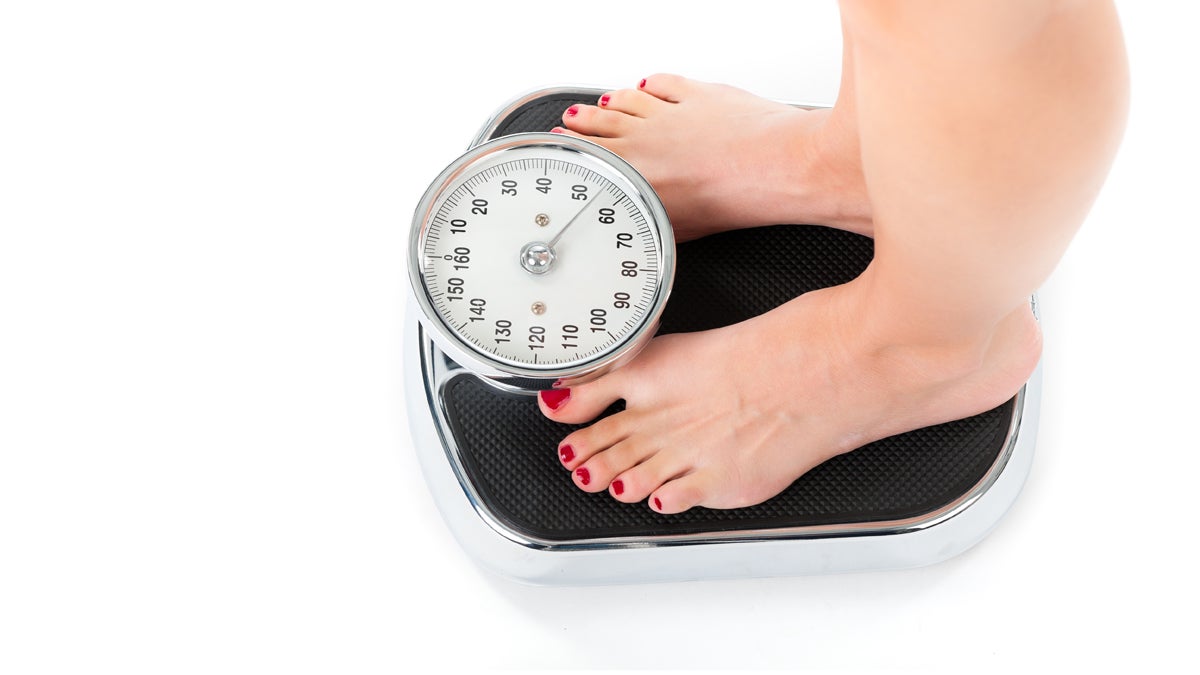Bryn Mawr BMI email about health and well-being, not beauty or worthiness

(Scale image courtesy of Shutterstock.com)
Some students at Bryn Mawr College are being told to lose weight. And they don’t like it one bit. I know just how they feel.
The bad guy in their story — and mine — is the much-feared BMI, or body mass index. This algorithm is a rough measure of whether your weight is healthy for your height. No more trustworthy organization than the American Heart Association pays attention to it.
It was with this in mind, no doubt, that Bryn Mawr College sent its students an advisory email telling them how to lose weight. They were directed to a voluntary program that included dieting, exercise and counseling. But the email wasn’t a general advisory. It went to just 100 young women whose BMIs, according to the students’ health center records, were over the recommended 25.0.
In a cleverly titled article called, “Weight, Weight, Don’t Tell Me,” reporter Sam Wood chronicles the despair, anger and humiliation that exploded in the wake of this advisory. Bryn Mawr students felt “targeted,” “mortified,” and “discriminated against,” making accusations that their venerable, historically female institution is engaging in “body policing” and “fat shaming.” The inevitable demonstration is to follow. (The college has since apologized.)
While I can certainly understand their embarrassment, allow me to offer my own story, along with its cautionary tale and happy ending.
It doesn’t get better, but you can
Last August, returning from family vacation, I visited my doctor for a persistent sinus infection. The nurse practitioner recorded my weight, height and temperature, listened to my symptoms, and prescribed an antibiotic. She then handed me a sheaf of papers. As I shuffled through them, one page jumped out. It was entitled, “How to Lose Weight.”
My face grew red with embarrassment. I hadn’t asked for advice about my weight, (being more concerned with the relentless pounding in my head) nor had the nurse mentioned it. But there it was in black and white: my height, my weight, and, in bold print, the declaration that my BMI was too high. Details for how to lose weight followed.
My first reaction: The nurse was a total coward! Why hadn’t she told me to my face? My second reaction: Her math must be wrong! My third reaction: This couldn’t really matter!
After all, I had been a size 6 until I turned 50. Then I edged up to a size 8 — so what? But lately, my size-10 jeans had grown a little snug. And those photos of me from our family vacation were not exactly flattering — maybe it was the light.
Indulging my state of denial, I then came up with 10 reasons, from the sublime to the ridiculous, why I didn’t have to worry about my BMI:
Everyone gains a few extra pounds when they get older.
If I lose just 7 pounds, my BMI will be normal.
Since I have osteoporosis, it’s actually better to weigh a few extra pounds. They might keep me from breaking a hip if I fall.
My weight is just fine. The real problem is I’m shorter than I used to be.
My pants feel tight because they shrank in the wash. (All three pairs of them.)
At least I’m not as big as that cashier at the Giant. I mean, really.
Of course I’m not as thin as my neighbor down the street. She never eats.
There are worse health issues to worry about than a few extra pounds.
A life without chocolate is not worth living.
I asked my husband if I was fat, and he said no. (Wise husband!)
It’s about preventive health care, not shame
Alas, reality soon sank in. I needed to shed a few pounds. I did it the old-fashioned way: more exercise and fewer calories. (And, yes, I still allowed myself that occasional chocolate bar.) Inside of two months, my BMI was a respectable 24.3, down from the nasty 25.6 that had started all the drama. I looked better, I felt better, and I was better.
So, Bryn Mawr students of high BMI: Do not despair! Your college is not out to shame you. Nor is it equating your weight with your beauty or worthiness as a human being. It is merely looking out for your well-being.
At no other time in your life than in college will it be easier for you to lose weight, get in shape, and stay fit. You will reap a lifetime of benefits, including lower risks for heart disease, stroke and diabetes. You will live longer and live better. You will consume fewer health care services.
And then you’ll have the good health you’ll need to demonstrate against those issues that are really important.
WHYY is your source for fact-based, in-depth journalism and information. As a nonprofit organization, we rely on financial support from readers like you. Please give today.

